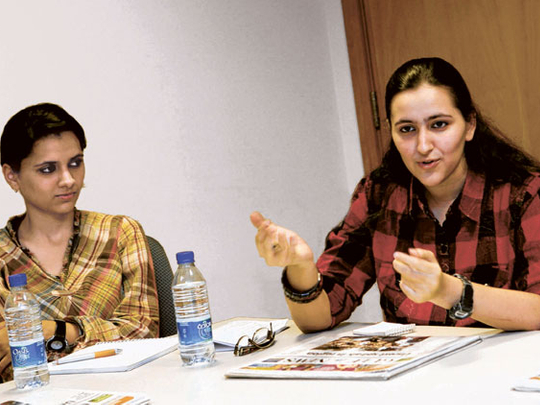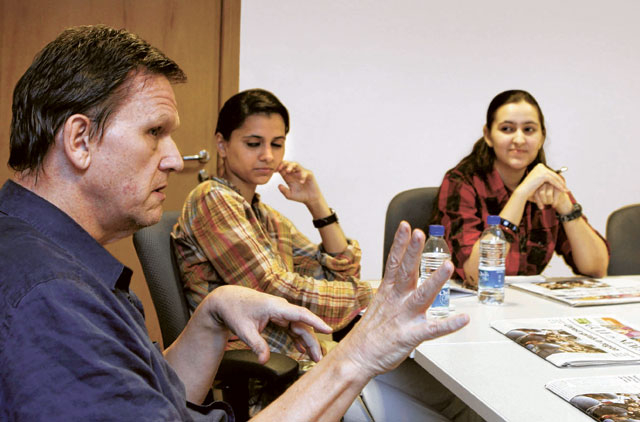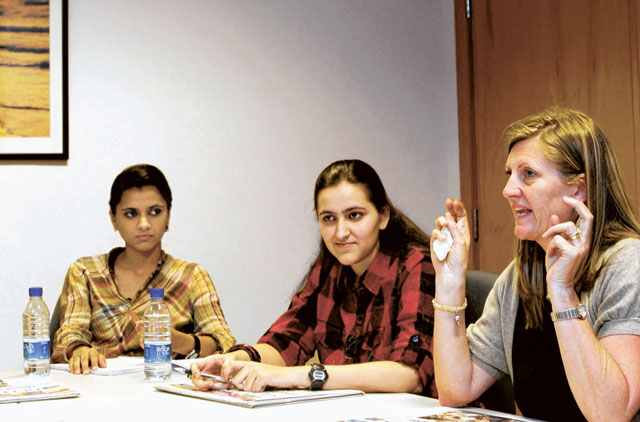
As one moves from one culture to another, actions like kissing, hugging or holding hands take unique meanings and get different reactions. But with more than 100 nationalities living together in the UAE, these cultural differences can become more apparent than ever.
Last week, the British embassy in the UAE decided to address these differences by educating expatriates about the laws and cultures of the UAE. Britons, according to statistics, are likely to be caught violating rules in the UAE more than anywhere else in the world except Thailand. In this month’s live debate, Gulf News readers talk about whether cultural sensitivity has become a thing of the past. Share your views at readers@gulfnews.com
Most expatriates know what is allowed and what isn’t, but they take it lightly because they see the country is tolerant.
Ann Al Sakar:
I don’t think [behaviour like] kissing in public, for some British expatriates, is something that they think is wrong. I think they need to be aware of it. They probably need to be told on the airlines when they are coming over or through some brochures or at the airport. It is very usual to see kissing in the streets in the UK, so in that case you have to create that awareness that it isn’t allowed here.
Fatima Khan:
I think not everyone is aware of what the rules are but many a times they are aware and yet they know that this country is tolerant and think they will get away with it. But as Ann said, it is the responsibility of probably the airlines that they are travelling on or the travel agency they are using [to make them aware]. You should be made aware of the rules and regulations here. Like they say, when in Rome, do as the Romans do. The country has its rules and regulations, and yes there are certain restrictions on the way you should conduct yourself in public, perhaps with drinking, but they have been listed out. You have to go through that.
Aisha Naseem:
When people are migrating to different countries, they are expected to take certain exams and are provided with documents for migration. An important brochure that is missing from that entire stack of documents is on what exactly is the country about. Some people may still ignore these rules, but if you have to follow rules and live in a country peacefully, then that should be the way to go.
Martin Thomas:
I have a different view. Even the notices in the malls were put up after certain incidents took place — it was a reaction. It is not that [foreigners] are not aware about the rules and regulations but the country sends contradictory messages. I am a psychologist, and if you have contradictory messages, you will accept the one that you understand.
The responsibility to educate foreigners lies with the respective embassies, not the country of residence.
Ann Al Sakar:
I think they should join together a bit [in taking responsibility]. Surely, you want expatriates to come here and help out with expertise, but you have to help these people out with rules and regulations. So, it must be a joint effort and also, may be, the companies should be giving the employees a package, saying these are the rules and regulations of the country and you should abide by it if you are going to work for our company.
Fatima Khan:
I think it is both their responsibility. The embassy, because they are sending their citizens, should make you aware of what the rules and regulations are of the country you are travelling to. Also, the country of residence should make sure that the person who is coming in should be comfortable adjusting to the new surroundings. So, perhaps an introductory session or two about the cultural sensitivities here would help. They could issue informative brochures for the airlines or to be placed at the airports and other points of entry. Making the travelling agencies aware so that when holiday makers are coming in they take part in this responsibility.
Aisha Naseem:
If you have people wearing swimsuits on the beach, and boards asking visitors to dress “sensibly”, the question is: what does sensibly mean? When you look at the way some people dress even at malls, considering some cultures, they are very indecent.
So, both the countries and embassies should join hands. The countries should be very clear that these are the [rules] that you have to abide by so that they are allowed to adjust. You should be given the rules and regulations, and told that this is the culture of the country, and then you decide whether you would like to continue working in your own country or travel to a new one.
Martin Thomas:
It is the travellers’ responsibility to find out what the rules are, while it is the country’s responsibility to say what the rules are. The problem is that the country doesn’t say what the rules are, and it changes them.
Travelling is no longer about learning new cultures.
Ann Al Sakar:
Globally, yes, I agree. People who travel now just do it for self-enjoyment, and not to find out about new cultures. It is all about: done that, been there, got the t-shirt.
Fatima Khan:
I think earlier countries wanted to be exclusive, they had exclusive cultures, exclusive rules. Then there was a need for globalisation, and everyone wanted to be “modern”, they did not really understand what it was but they wanted to be modern. Whether it is Goa or Mumbai in India, they compromised their position completely in order to attract visitors. Once the visitors were there, they realised there wasn’t much difference between the two countries, and once they settled in, they felt that they could do as they liked. Suddenly countries woke up to the fact that they’ve lost touch with their own culture and now they want to introduce certain rules, but it is a reaction. So, travelling was an enrichment process earlier, but now they have forgotten what the essence was.
Aisha Naseem:
There is something special about your country which attracts people in. If there are clubs here and clubs there, what difference does it make? You are going on a holiday and doing the same thing, so you are not really visiting a place, you are just back home. Here, we live in air-conditioned homes, so if we go to a country where they use hand fans, for example, it is going to take time for you to adjust. When people are travelling, they have to make sure that they are mentally and physically ready to take the on the strain which will be needed to adjust.
Martin Thomas:
I think you have to look at it from the traveller’s point of view and the country’s point of view. So, I don’t think there is a ‘should’, I don’t think that countries ‘should’ set themselves up as a ‘home away from home’ or ‘should stick to their culture’. A country makes its choice. I just came back from Bhutan where they have made the message very clear that you are a guest and we have a different culture and way of life.
Aisha Naseem:
There is the Shaikh Mohammad Centre for Cultural Understanding in the Bastakiya area. Pay Dh25 and you will have [all the information about] the Emirati culture. If you really want to understand someone’s culture, and if you are willing to travel to the country, you can just go there and find out about the culture.
Conclusion
- Readers agreed that while visitors may be unaware of cultural sensitivities of a country, most expatriate residents have a good understanding of a country’s culture.
- Readers agreed that the country of residence should clearly state their rules, regulations and cultural practices to make visitors aware.
- The responsibility to inform foreigners lies both with the embassies as well as the country of residence.
- Most travellers are no longer interested in learning about new cultures.











